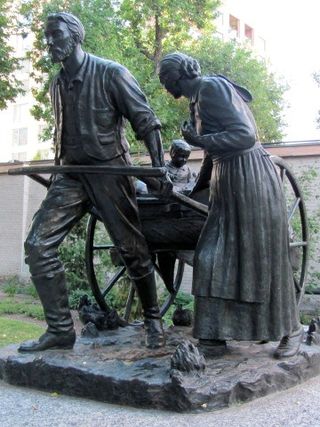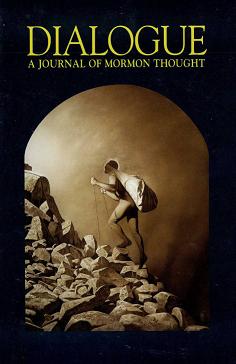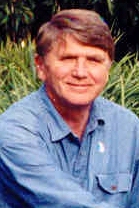Related Research Articles
The September Six were six members of the Church of Jesus Christ of Latter-day Saints who were excommunicated or disfellowshipped by the church in September 1993, allegedly for publishing scholarly work against or criticizing church doctrine or leadership. The term "September Six" was coined by The Salt Lake Tribune and was used in the media and subsequent discussion. The church's action was referred to by some as evidence of an anti-intellectual posture on the part of church leadership.

The Foundation for Ancient Research and Mormon Studies (FARMS) was an informal collaboration of academics devoted to Latter-day Saint historical scholarship. The organization was established in 1979 as a non-profit organization by John. W. Welch. In 1997, the group became a formal part of Brigham Young University (BYU), which is owned and operated by the Church of Jesus Christ of Latter-day Saints. In 2006, the group became a formal part of the Neal A. Maxwell Institute for Religious Scholarship, formerly known as the Institute for the Study and Preservation of Ancient Religious Texts, BYU. FARMS has since been absorbed into the Maxwell Institute's Laura F. Willes Center for Book of Mormon Studies.

Hugh Winder Nibley was an American scholar and member of the Church of Jesus Christ of Latter-day Saints who was a professor at Brigham Young University (BYU) for nearly 50 years. He was a prolific author, and wrote apologetic works supporting the archaeological, linguistic, and historical claims of Joseph Smith. He was a member of the LDS Church, and wrote and lectured on LDS scripture and doctrinal topics, publishing many articles in the LDS Church magazines.

The Encyclopedia of Mormonism is a semi-official English-language encyclopedia for topics relevant to the Church of Jesus Christ of Latter-day Saints. The encyclopedia's five volumes have been digitized and are available for free online via the Harold B. Lee Library's official website.
Martha Nibley Beck is an American author, life coach, speaker, and sociologist.

The Mormon religion is predicated on what are said to be historical events such as the First Vision of Joseph Smith and the historicity of the Book of Mormon, which describes a detailed pre-Columbian history of the Americas. Joseph Fielding Smith, the tenth president of the Church of Jesus Christ of Latter-day Saints, declared that "Mormonism, as it is called, must stand or fall on the story of Joseph Smith. He was either a prophet of God, divinely called, properly appointed and commissioned, or he was one of the biggest frauds this world has ever seen. There is no middle ground." As Jan Shipps has written, "Mormonism, unlike other modern religions, is a faith cast in the form of history," and until after World War II, Mormons did not critically examine the historical underpinnings of their faith; any "profane" investigation of the church's history was perceived "as trespassing on forbidden ground."
Thomas Glen Alexander is an American historian and academic who is a professor emeritus at Brigham Young University (BYU) in Provo, Utah, where he was also Lemuel Hardison Redd, Jr. Professor of Western History and director of the Charles Redd Center for Western Studies. After studying at Weber State University (WSU) and Utah State University (USU), he received a PhD from the University of California, Berkeley in 1965. He taught history at BYU from 1964 until 2004, and served in the leadership of various local and historical organizations.

Dialogue: A Journal of Mormon Thought is an independent quarterly journal that addresses a wide range of issues on Mormonism and the Latter Day Saint Movement.
The Neal A. Maxwell Institute for Religious Scholarship, or Maxwell Institute, is a research institute at Brigham Young University (BYU). The institute consists of faculty and visiting scholars who study religion, primarily the Church of Jesus Christ of Latter-day Saints. The institute is named after a former LDS Church apostle, known for his writings and sermons.

George Eugene England, Jr., usually credited as Eugene England, was a Latter-day Saint writer, teacher, and scholar. He founded Dialogue: A Journal of Mormon Thought, the oldest independent journal in Mormon Studies, with G. Wesley Johnson, Paul G. Salisbury, Joseph H. Jeppson, and Frances Menlove in 1966, and cofounded the Association for Mormon Letters in 1976. He is also widely known in the Church of Jesus Christ of Latter-day Saints for his many essays about Mormon culture and thought. From 1977–1998, England taught Mormon Literature at Brigham Young University. England described the ideal modern Mormon scholar as "critical and innovative as his gifts from God require but conscious of and loyal to his own unique heritage and nurturing community and thus able to exercise those gifts without harm to others or himself."
Dean Cornell Jessee is a historian of the early Latter Day Saint movement and leading expert on the writings of Joseph Smith Jr.
Boyd Jay Petersen is program coordinator for Mormon Studies at Utah Valley University (UVU) and teaches English and literature at UVU and Brigham Young University (BYU). He has also been a biographer of Hugh Nibley, a candidate for the Utah House of Representatives, and president of the Association for Mormon Letters. He was named editor of Dialogue: A Journal of Mormon Thought for the term 2016-2020.
James Brown Allen was an American historian of Mormonism and was an official Assistant Church Historian of the Church of Jesus Christ of Latter-day Saints from 1972 to 1979. While working as Assistant Church Historian, he co-authored The Story of the Latter-day Saints with Glen Leonard. After Ezra Taft Benson dismissed the book as secular new history, other events led to the dissolution of the LDS Church History department in 1982. Allen resigned as Assistant Church Historian in 1979, returning to work at Brigham Young University (BYU) full-time.
Richard Douglas Poll was an American historian, academic, author and member of the Church of Jesus Christ of Latter-day Saints. His liberal religiosity influenced his notable metaphor about "Iron Rod" vs. "Liahona" LDS Church members.
The Religious Studies Center (RSC) at Brigham Young University (BYU) sponsors and publishes scholarship on the culture, history, scripture, and doctrine of the Church of Jesus Christ of Latter-day Saints.
Mormon studies is the interdisciplinary academic study of the beliefs, practices, history and culture of individuals and denominations belonging to the Latter Day Saint movement, a religious movement associated with the Book of Mormon, though not all churches and members of the Latter Day Saint movement identify with the terms Mormon or Mormonism. Denominations of the Latter Day Saint movement include the Church of Jesus Christ of Latter-day Saints, by far the largest, as well as the Community of Christ (CoC) and other smaller groups, include some categorized under the umbrella term Mormon fundamentalism.

The John Whitmer Historical Association (JWHA) is an independent, nonprofit organization promoting study, research, and publishing about the history and culture of the Latter Day Saint movement. It is especially focused on the Community of Christ, other midwestern Restoration traditions, and early Mormonism. The Community of Christ's approach to its own history was influenced, in part, by historical problems raised and explored through JWHA publications and conferences, and those of its sister organization, the Mormon History Association. JWHA membership numbers around 400 and is open to all, fostering cooperation with LDS and non-Mormon scholars.
Wesley Preston Walters was a pastor of the United Presbyterian Church in Marissa, Illinois. He is notable for his historical research critical of the Latter Day Saint Movement, specifically Joseph Smith's First Vision account. Historian Richard Bushman, who often differed with Walters' views, said that Walters, "performed a very positive service to the cause of Mormon History because he was a delver. He went deep into the heart of the archives. [He] made us realize that we can't assume anything. Everything had to be demonstrated and proved."
The sophic and mantic were originally defined by Hugh Nibley in 1963 as a way of describing naturalistic and supernaturalistic ontologies. H. Curtis Wright, a professor in the Brigham Young University (BYU) Library information science program, popularized the distinction and several Latter-day Saint (LDS) scholars referenced it, mostly in the 1990s. Wright wrote that while mantic approaches include sophic knowledge, sophic approaches exclude mantic knowledge.
References
- Louis C. Midgley at the Mormon Literature and Creative Arts Database
- Louis C. Midgley papers, MSS 2806, L. Tom Perry Special Collections, Harold B. Lee Library, Brigham Young University